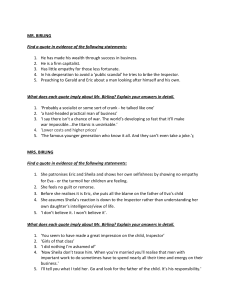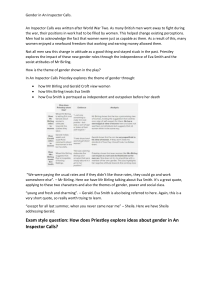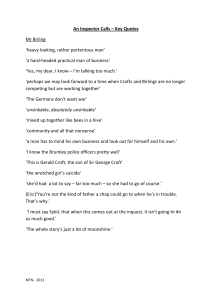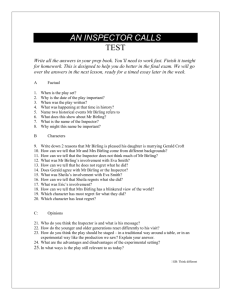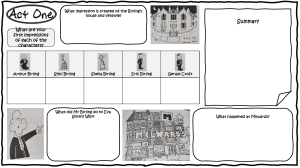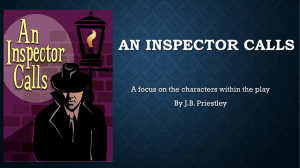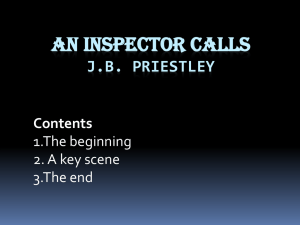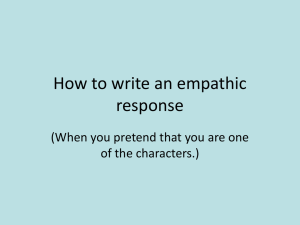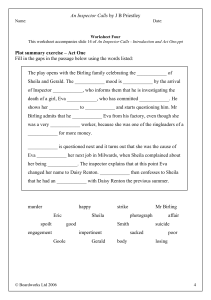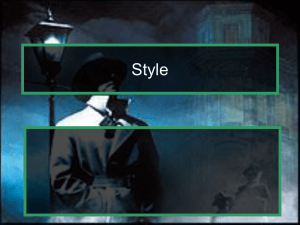LOVE in an inspector calls
advertisement
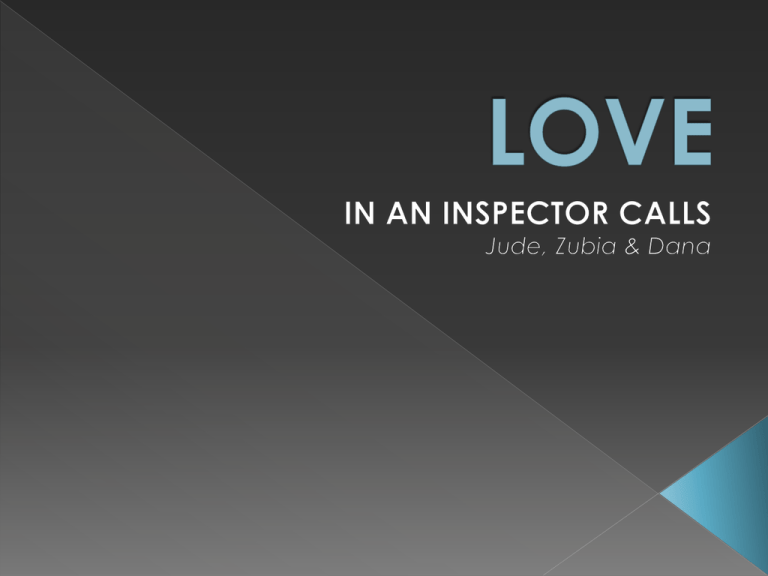
Love or the lack thereof, is one of the main themes in An Inspector Calls. Not only does it play a drastic role in bettering the audience’s understanding of relationships between the characters, but it also aids us in coming to terms with social classes, gender stereotypes, and life in Britain 1912. Throughout the duration of the play, the inspection takes a great toll on Sheila and Gerald’s relationship. In the opening scenes, we can see them drinking to each other; “I drink to you, Gerald.” however after the Inspector’s exit, they are no longer certain if their engagement withstands, “Everything’s alright now. Sheila. What about this ring?” “No, not yet. It’s too soon, I must think.” After the revelations, Sheila’s aforementioned doubts are confirmed; “I was awfully busy at the works all the time” “Yes, that’s what you say”, and later when questioning Gerald about Daisy Renton; “You not only knew her but you knew her very well”. At the start, Sheila showcases a naïve love for Gerald, however as the play progresses we learn that the relationship was built on false pretences, and encouraged by the parents for their own financial and business related benefits. This makes the audience question the substance that their relationship was built on. Moreover, Gerald provides us with evidence that allows us to question his motives towards marrying Sheila; even after his sinful act of cheating, he showcases little to no respect towards her, attempting to cover up the truth for as long as time will allow him to do so. Even then, when it becomes inevitable for it to be revealed, he is importunate on obstructing her knowledge of the situation, insisting: ‘’It would be much better if Sheila didn’t listen to this story at all.’’ And to her,” ‘You’re obviously going to hate this, so why on earth don’t you leave us to it?’’ This also links in to the gender dynamics of society at that time which perceived woman to be of a substandard and unable to cope with anything more demanding than everyday acts. This is subtly portrayed in parts of the play where Gerald seems overpowering or demanding, particularly at the start of the play where he has an air of being in control. Later however, the roles are eventually reversed as the interrogations advance sand Sheila gains confidence, actively voicing her opinions. She says to Gerald “You’ll see, you’ll see”, threatening him with an exploitation but also warning that there is unfinished business regarding his affair with Daisy Renton. ‘I didn’t feel about her as she felt about me.’ (Pg38) ‘I was sorry for her.’ (Pg37) ‘I suppose it was inevitable. She was young and pretty and warm-hearted – and intensely grateful. I became at once he most important person in her life.’ (Pg37) There is no love involved in this relationship but rather lust. Eric is with her for his own enjoyment and because ‘she was pretty and a good sport’. Eva is forced to turn to prostitution as she has no other way to make money for herself to survive. Eric may have offered to marry Eva but not because he cared for her. Eric is still young and foolish. The inspector says ‘Just used her for the end of a stupid drunken evening, as if she was an animal, a thing, not a person.’ The Inspector’s anger towards Eric shows Priestley's view on capitalism and the was that the rich were allowed to mistreat the poor because of it. Once again, Priestly is using the Inspector to voice his own opinions. Although married, there is very little love shared between Mr & Mrs Birling. It is seen as a staged love, put on just for show to seem like a respectable, high class family as they are both conscious about their social image. Mrs Birling is described as ‘a rather cold woman and her husbands social superior’. She feels able to look down on him in this way and isn’t a very affectionate woman, as shown later on in the play with Eva and the charity committee, she shows no kindness. Mr Birling is also able to look down on his wife because she is a female during sexist times. He says ‘clothes mean something quite different to a woman’ when speaking about his wife. This makes her seem intellectually incapable and very aloof. Their strongest bond would be their shared view on capitalism as well as their oblivion of what happens in their children’s lives. It seems that they don’t share information with each other. For example, Mrs Birling would have found it strange that somebody at the charity committee used the Birling name, however she never told her husband about it. Both Mr & Mrs Birling encourage Sheila to go into a marriage with very little love involved. This reflects on the values of marriage that they both posses. Their daughter’s wedding was planned to benefit the Birling business and also improve the image of the Birling family, the fact that Gerald cheated doesn’t alter these aims. After Sheila hands Gerald the ring back, Mr Birling says ‘Now Sheila, I‘m not defending him. But you must understand that a lot of young men-’. Mr Birling tries to explain Gerald’s actions to his own daughter. By pushing their own daughter into a relationship without love, it shows how unimportant they both view love to be in a marriage. The Inspector wants everyone to come accept the responsibility of their actions, unravelling all their lies one by one.
